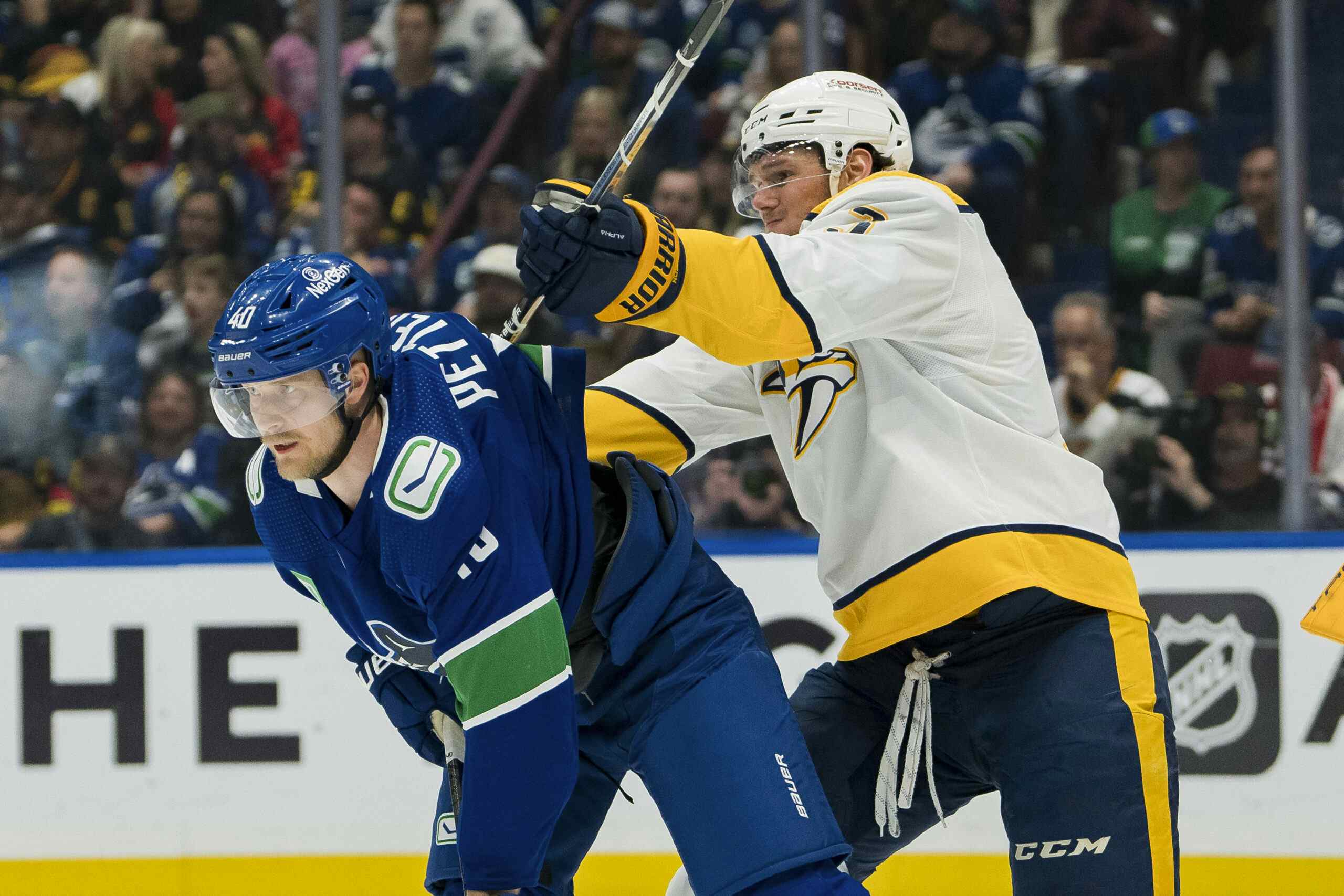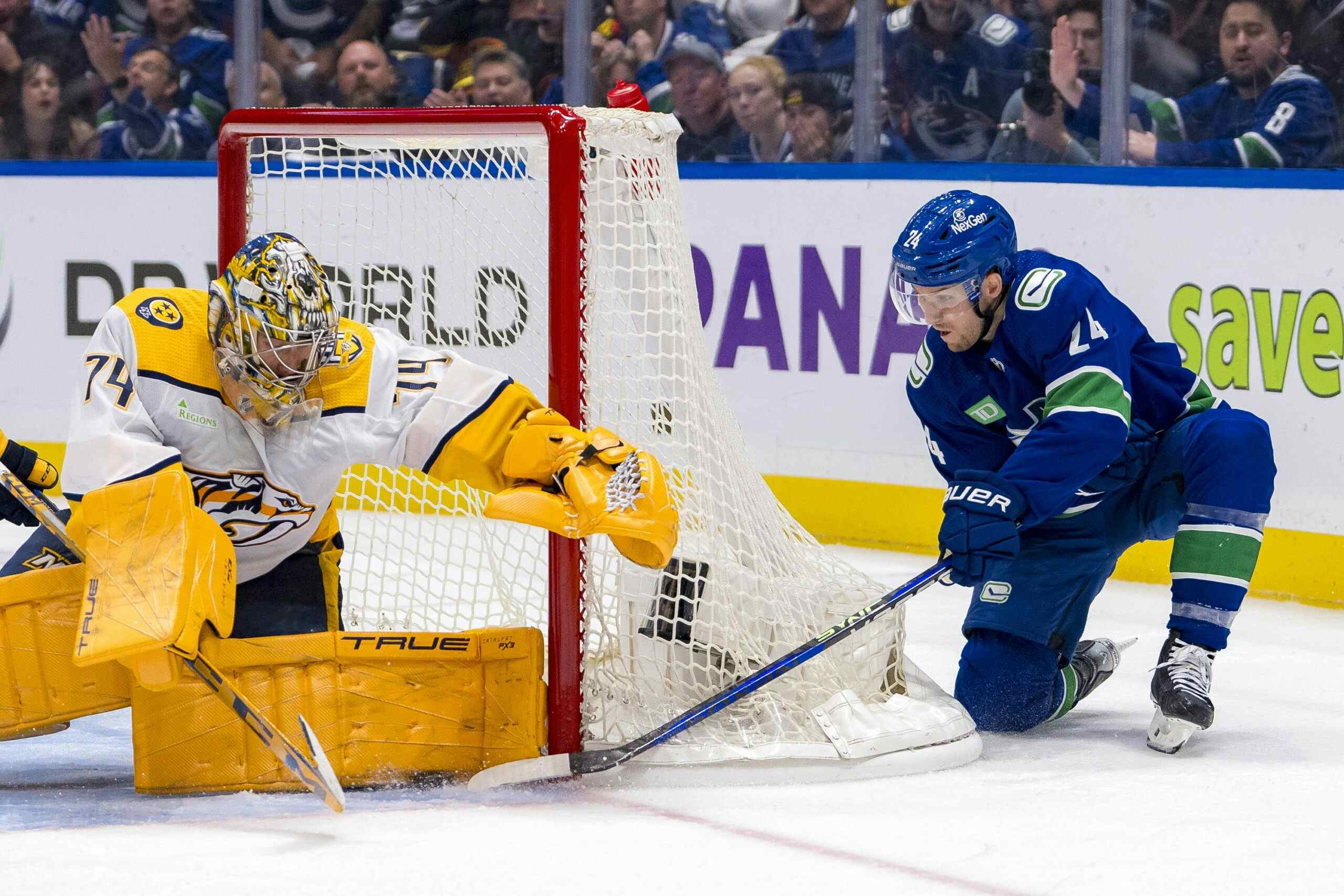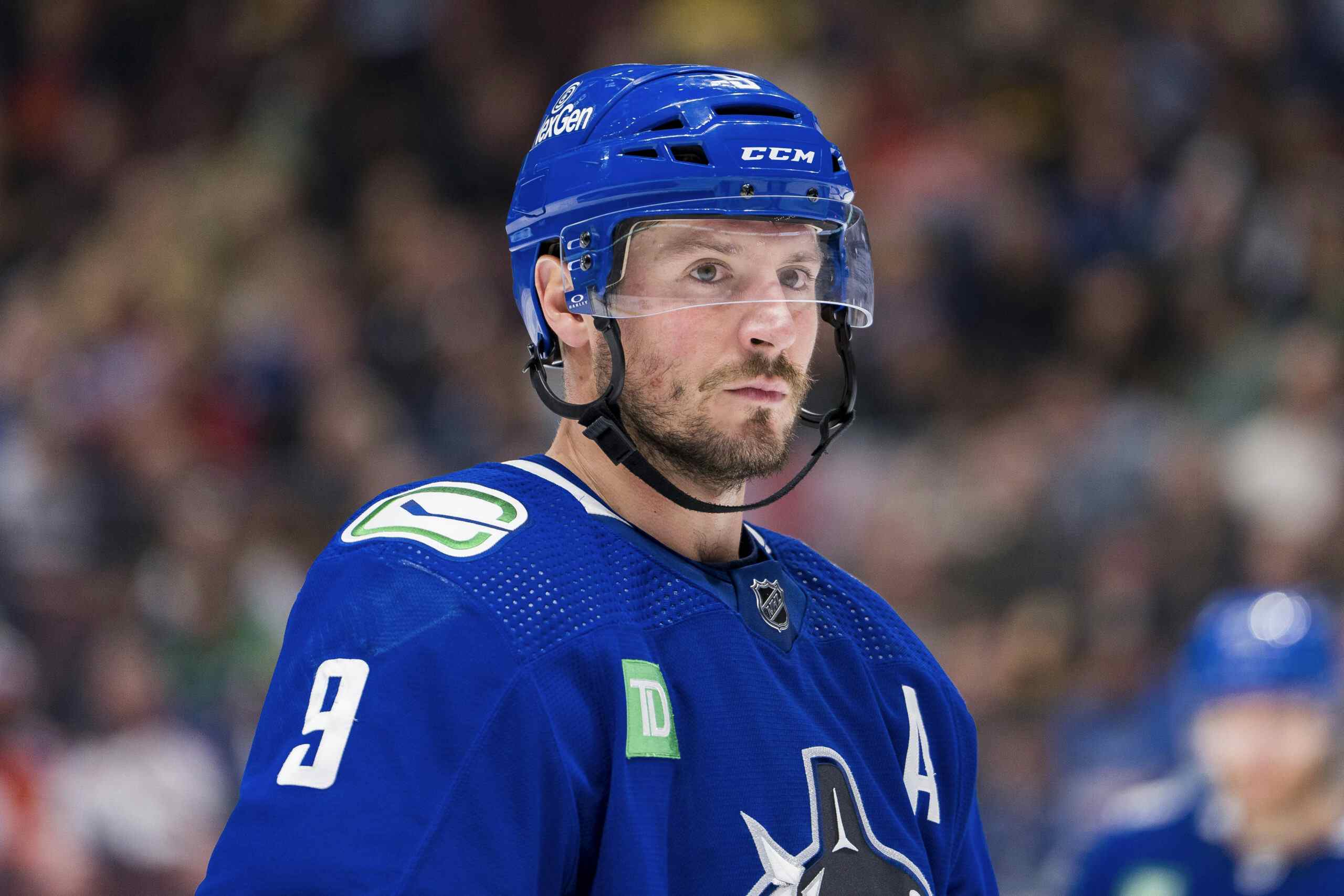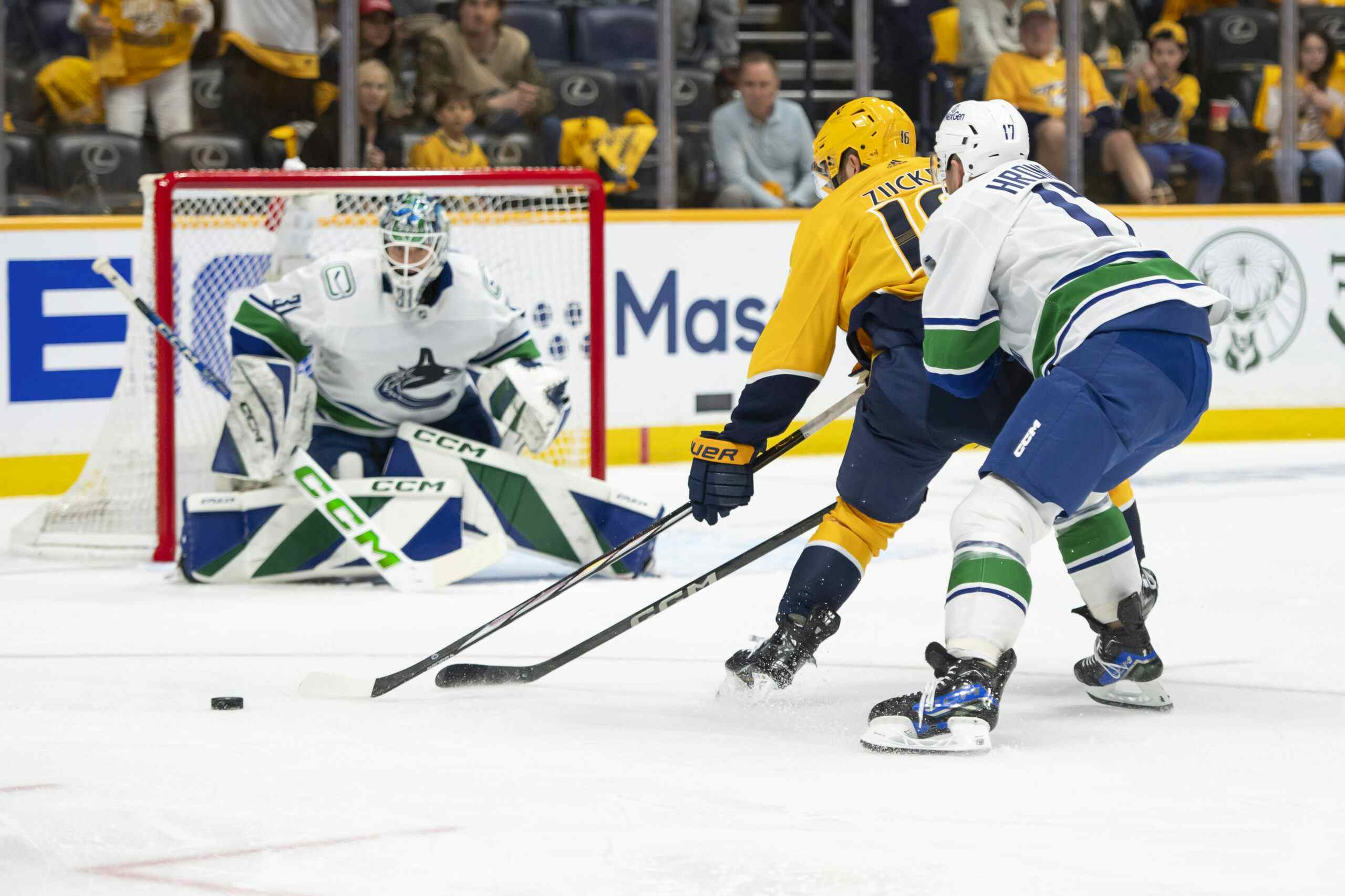Coaching Candidate Profiles: John Stevens
So much of what a hockey coach does happens behind the scenes, and away from the view of fans and media. Most of the time we just don’t know that much about how good a particular coach is, often until that coach is fired (like what happened with Bruce Boudreau)…
With that skeptical outlook in mind, we’ll launch our "Coaching Candidate Profile" series today with a look at John Stevens. John Stevens is a current assistant coach for the Los Angeles Kings, and according to Bob McKenzie the Canucks are pretty interested in interviewing him once his season ends.
Does Stevens make sense as Alain Vigneault’s successor? Read past the jump.
The Resume
As a player, John Stevens was a rugged, stay-at-home type defenceman with limited success at the NHL level (or, he had a similar type of playing career to former Canucks head coach Alain Vigneault). But Stevens was enormously successful in the AHL, he was even inducted into the AHL’s Hall of Fame in 2012, and managed to appear in a tick more than fifty NHL games over a fourteen year professional career.
Stevens’s playing career career came to a premature end when he was struck in the right eye by an errant puck almost fifteen years ago. According to an Associated Press story from 2006 Stevens is "still troubled by blurry vision" as a result of the injury. Despite the accident, Stevens didn’t miss so much as a beat. Though he hung up his skates for good, he immediately took then Flyers General Manager Bobby Clarke up on an offer to join the Philadelphia Phantoms as an assistant coach. After two seasons (one full season and one partial season) as an AHL assistant, Stevens took over as the headcoach of the Phantoms and served in that capacity for six seasons.
As an American Hockey League head coach, Stevens amassed two-hundred and thirty wins and one-hundred and eighty-one losses, in addition to thirty-three ties and sixteen overtime losses (the tie was abolished mid-way through Stevens’s Phantoms tenure). In the playoffs, a dominant Calder Cup championshp run by the Philadelphia Phantoms in 2005 boosts Steven’s postseason record to 30 wins and 18 losses as a head-coach in the Calder Cup playoffs. Stevens’s Phantoms teams won six of nine postseason series they played.
We delved superficially into John Stevens’s American Hockey League head coaching background earlier today, and I think it’s worth repeating here because it leads naturally into a more general but critical point about coaching:
Stevens spent the better part of a decade coaching Philadelphia’s minor league team (the then Philadelphia Phantoms), making the postseason more often than not and guiding a loaded Phantoms team to the Calder Cup in 2005. That team was seriously stacked by the way and included: R.J. Umberger, Jeff Carter, Mike Richards, Patrick Sharp, Dennis Seidenberg, Joni Pitkanen, Ben Eager and Jon Sim.
Basically when Philadelphia’s prospect cupboard was full with future NHLers (many of whom would go on to play big roles on Stanley Cup Winning teams), Stevens was able to win a Calder Cup trophy and compete for the best regular season record in the league. On the other hand, in 2002-03 and 2005-06, Stevens’ coaching ability wasn’t enough to coax a playoff berth out of teams that were led by the likes of John Slaney, Tony Voce and Mark Greig. I don’t mean to knock John Stevens here, but it’s worth remembering that coaches are most often at the mercy of the quality of their roster…
In 2006-07, John Stevens was promoted to assistant coach with the Philadelphia Flyers, working for Ken Hitchcock. Shortly thereafter Ken Hitchcock was canned and John Stevens replaced him. He was eight games into his first season as an NHL assistant when he took over behind the Flyers bench.
Ravaged by injuries and unfathomably bad goaltending (the Flyers started Mike Leighton, Marty Biron, Robert Esche and Anterro Nittymaki in the 2006-07 season, none of those four goaltender managed an even-strenght save percentage better than .900) the Flyers were godawful, and ended up well in the lottery.
That summer Stevens was retained, the Flyers drafted James Van Riemsdyk third overall, stole Scott Hartnell and Kimmo Timonen from the cash strapped Predators, and inked Daniel Briere to a massive deal in free-agency. Obviously they improved significantly the next season, even though they continued to be a mostly underwhelming team at five-on-five. The reason? I’d suggest it was along the blue-line where Rory Fitzpatrick played 18 games, Jim Vandermeer played 28 games and Ryan Parent played 22 games. Jason Smith and Derian Hatcher were well past their "best by" dates at that point as well, and beyond Kimmo Timonen and Brayden Coburn there just wasn’t much talent at Stevens’s disposal.
The Flyers overachieved in Stevens’s first full season thanks in part to Marty Biron – who turned in his best professional season that year – and killer special teams (Philadelphia’s power-play was second in the league that season – though that was percentage driven, while their penalty-killing was in the top-10). In the playoffs the Stevens coached Flyers defeated the Capitals and then the Montreal Canadiens before being dispatched by Sidney Crosby’s Penguins on their first of two consecutive runs to the Stanley Cup Final. Both Coburn and Timonen were injured in that third round series…
The Flyers were a better five-on-five team in Stevens’s third season and continued to be a top special teams club (Stevens’ Flyers were comfortably in the top-10, though outside the top-5 on both the power-play and penalty-kill). But their tangible improvements didn’t result in playoff success, as they lost again to Sidney Crosby and the Penguins in the first round. That Penguins team would go on to win the Stanley Cup.
In the summer of 2009 the Flyers added a legitimate top-pairing defenceman in Chris Pronger, and wouldn’t you know it, they were suddenly a solid five-on-five team! That Flyers club had big expectations, however, and Stevens proved unable to survive a 13-12-1 start and was fired on the heels of two straight shutouts (one of which came against the Canucks). As Philadelphia’s head-coach in parts of four seasons Stevens amassed a 120-109-34 record. We’ll get into this particular season (the 2009-10 campaign) a bit more later in this profile.
Stevens wasn’t out of a job long as he was promptly hired by Terry Murray, his former assistant in Philadelphia, to be an assistant coach out in sunny Los Angeles. In his time with the Kings John Stevens has worked under two different head-coaches and even became the head coach in the short interim between the firing of Terry Murray and the hiring of Darryl Sutter. Late last week Jason Botchford did an excellent job summarizing some of what has gone right for John Stevens behind the Kings bench over the past three seasons:
Stevens reputation has only improved as the assistant in LA in charge of the defence.He was able to get through to Drew Doughty in a way no one else could. Does the name Alex Edler come to mind? Doughty and Stevens clashed early, and don’t you think the Canucks could use some clashing? Over time they developed a great working relationship and Doughty took off as a player when he understood Stevens was offering constructive criticism, not picking on him.He’s creditted with brining along Jake Muzzin, 24, a defenceman who has flourished out of out of nowhere. Muzzin was a Penguins draft pick who didn’t sign with Pittsburgh. The Kings signed him as a free agent. Stevens has done excellent work protecting Muzzin against tough tough matchups in this his rookie year.Stevens also showed a deft hand with Slava Voynov, who has become one of the NHL’s most underrated defencemen. When he was the Kings interim coach, Stevens gave Voynov some tough love making the rookie a healthy scratch after he was an established starter for month playing 17 or 18 minutes a game. Watch Voynov play, and remember this is only his second year.
With the Los Angeles Kings initially, John Stevens ran both the defence and the penalty-kill. That changed somewhat when Darryl Sutter took over and running the special teams units became more of a collorative effort among the coaches. Stevens’ work with the Kings young blueline has been pretty impressive the past couple of seasons, though obviously he’s had a good deal of talent to work with as well…
The Data
From a purely analytical perspective, it’s neat when a coach gets fired in midseason – like Stevens was in 2009 – because it allows us to gauge, to some extent, the impact of coaching in a way we usually can’t. Basically we can do a "with or without you" for the 2009-10 Flyers and John Stevens, and try to answer the question: "how did essentially the same group of players fare under two different coaches?"
Following Stevens’s dismissal in 2009, the Flyers hired Peter Laviolette to guide the club and they went on something of a Cinderella run to the Stanley Cup Final as a seventh seed. That run included a comeback from a 3-0 series deficit against the Boston Bruins.
The obvious narrative then is that the Flyers were right to fire Stevens becasue look at all the playoff success they had afterwards. But looking at the data, it really couldn’t be clearer, the Flyers were not as good a team after they fired Stevens as they were in the 26 games before he was canned.
Here’s a basic table that includes even-strength unblocked shot differential – commonly, if off-puttingly referred to as "Corsi" – for the Flyers as a team with John Stevens as a headcoach in 2009-10 (26 games), and thereafter (for 56 games). I’ve expressed Philadelphia’s unblocked shot differential with Stevens and without him as a percentage, and I’ve included both the raw total and a "score close" number to correct for score effects. Meanwhile I’ve also included goals for and against because obviously, at the end of the day, that’s what really matters.
One final qualifier 26 games isn’t as big a sample as I generally prefer when trying to judge true team quality (30 games tends to be where we can make some definitive conclusions). Still it’s close enough that this is a worthwhile excercise, but I wouldn’t describe it as definitive or anything:
| 09-10 Flyers | GP | Raw CF% | Score Close CF% | GD | Score Close GD |
|---|---|---|---|---|---|
| With Stevens | 26 | 53.20% | 51.60% | +8 | +2 |
| Without Stevens | 56 | 50.20% | 50.40% | -8 | -1 |
Again, the difference in sample size makes this a bit of an unfair comparison, but the evidence suggests that Stephens had the Flyers firing at all cylinders at even-strength in 09-10, and that Laviolette never really got them back to that point over the balance of the regular season.
On the other hand, there’s nothing odd with Philly’s percentages in the twenty-six games before they let Stevens go, and a simple data based look like this will obviously miss a whole host of things that matter, from the interpersonal relationships in the room to the special teams performance.
During Stevens’ time as head coach in Philadelphia, the Flyers were excellent on special teams, and about as good as you’d expect at five-on-five depending on the quality of their goaltending and top-four defensive group. Overall, I think it’s fair to describe Stevens’s head coaching track record as reasonably impressive by the numbers.
Does he fit in Vancouver?
Vancouver has a number of key pieces who, despite their talent, have battled inconsistency over the past few seasons (Zack Kassian, Alex Edler chief among them). Well from Jake Muzzin, to Brayden Coburn, to Drew Doughty – Stevens appears to have a reasonably good track record developing young players (and defenceman in particular).
Here’s what John Stevens had to say to Helene Elliott about working with Drew Doughty during the postseason last year:
“I was just trying to get him really focused in on the details, the preparation and the practice habits and all that stuff that I knew could make him an even better player,” Stevens said. “On top of that, Drew might be one of the most gifted, talented players ever and I was probably one of the least gifted, talented players ever, so we have two different personalities.“I was really trying to get a marriage of his really great, God-given talent and his commitment to focus on details and fundamentals. To his credit, he’s done that.”
Yeah I think a player like Zack Kassian could benefit from that sort of mentorship…
Here’s how Stevens fared from Doughty’s perspective (from that same piece). Stevens’s biggest impact appears to be making him take his job more seriously:
"My first couple years I would kind of get by making those mistakes and no one would really say anything to me or be hard on me with it… I think the No. 1 thing was my practice habits. I’d go into practice just going through the motions, just kind of doing what I had to do to perform well in practice, I guess you could say. [Stevens] kind of made me realize that you’re not going to get anywhere, you’re not going to get any better, just going through the motions. You have to work on your shot. You have to work on making sure every pass is tape-to-tape and you’ve almost got to focus in practice like you do in a game, and I’m a lot better at that."I’m feeling great on the ice. I’m jumping in the play more than I ever have in my career and I’m able to do that pretty easily. I’m not getting tired. I can play those big minutes and be able to do that every shift. A lot of that has to do with really pushing myself in practice."
Since this offseason began, Mike Gillis has repeatedly emphasized the need for his team to get younger. It’s a need that is as much borne out of a decreasing salary cap as it is an aging roster, frankly. On the Team1040 last week, Gillis said the following (which is hard not to read as something of a shot across Alain Vigneault’s bow):
"We have some (younger) players who we think are going to push for roster spots on this team. But they have to have the opportunity and you have to live with their mistakes early on knowing that they’ll be better from the mid-point onwards. Those are the sort of changes in philosophy that we’ve got in our plan that we’re going to execute on to the best of our ability."
With the way the winds are blowing this summer for the Canucks, I’d have to think John Stevens’s lengthy track record developing young players (Richards, Carter, Sharp, Seidenberg, Voynov, Doughty, Muzzin, Martinez) will be viewed as a particular asset. Combine that with his decade of head coaching experience (between the AHL and the NHL), and the fact that he’s had success at every level, and it makes sense that Stevens is believed to be at or near the list of Vancouver’s coaching candidates wish list…
Approaches on Coaches
In putting together our coaching profiles this week, we’ve decided to chat with media folks who cover the coaches on a day-to-day basis. We’re basically just trying to get a better sense of the coaches role, their responsibilities and personality.
what follows are quotes from The Mayor John Hoven, an accredited blogger who covers the Los Angeles Kings and runs the indispensable Mayor’s Mannor site.
On how much credit John Stevens deserves for Drew Doughty’s maturing two-way game:
"Doughty gives a lot of the credit to John Stevens for helping him kick his game to the next level, for taking him under his wing and helping him develop as a player. We’ve seen this season a more mature player, a more complete player. Doughty used to chirp a lot and occasionally argue with the referees and he still does sometimes – he’s a younger player – but he’s toned it way down. He’s matured tremendously with Stevens guidance, especially late last season."
On John Stevens approach to players:
"He’s likely been more of a ‘players coach’ in Los Angeles, partly because of the role he’s in now compared to being a head coach in Philadelphia. When you look at the personalities in L.A. – like Davis Payne – he’s cut from a similar cloth as Darryl Sutter, that Western Canadian mentality of hard work.With John Stevens, he’s more, I don’t want to say he’s more relaxed or less intense… but he’s more about the development of the players and isn’t in a role where he has to be the heavy handed disciplinarian (that falls squarely on Darryl Sutter)."
On John Stevens’s handling of the media (don’t underrate this as a factor in the Vancouver market):
"Quite honestly (the media) hasn’t had much interaction with Stevens. I don’t think it has anything to do with his disinterest or inability to deal with the media, it’s just kind of the way things run in Los Angeles. We communicate with Sutter. If you ask specifically to talk to Stevens, or Ranford or Payne then they’re made available to you.
On Stevens’ view of the game and his personality:
"My sense of Stevens, from the few times I’ve spoken with him, is that he’s very specific, very detailed, analytical, well thought out and articulate – those would be some of the words or phrases I’d use to describe his personality."
Choice Quote
I found this quote, in which John Stevens talks at length about visors, from an old interview he did with Kukla’s.
Stevens, as we’ve already talked briefly about, had his playing career cut short when he was struck in the eye by a puck, and he makes it very clear in his comments about wearing visors that he’d much prefer his players do so.
But it’s interesting to hear the way his comments expertly straddle the "macho" old school view of hockey and hockey players, with the sensible, risk-averse ethos of player safety:
To me now, there’s so many players that have grown up with advisors. When I played Junior hockey, you didn’t have to wear a visor. We didn’t wear visors. My last year of Junior hockey, you wore one. You got so used to playing without one, you almost couldn’t wait to get it off again just because I wasn’t used to it.But you see so many players coming into the league now that don’t know anything different. That’s all they’ve ever done is worn face protection. They’ve never played without a visor. To me, that’s a situation where you maybe like to see them leave it on… It doesn’t affect the way they play.I think the argument was kind of a macho thing or maybe it was too hot in the building. I think the way the buildings are cooled off now it is less of an issue. Steve Downie wanted to take his off here, and I asked him why. Why do you want to take it off. You have a good reason. And three days later you got hit between the eyes with the puck…So, to me, it doesn’t matter what you do. Visor is just another thing that if you’re not going to wear one, I’d like to know a good reason why you’re not going to wear one. If there is a good reason, we’ll live by it. If you’re growing up with it, you’re used to it. It doesn’t affect your level of play, ability to see or the fact that you’re getting hot. It’s not a bad idea to wear one.
Other Coaching Related Content from CanucksArmy:
Recent articles from Thomas Drance






